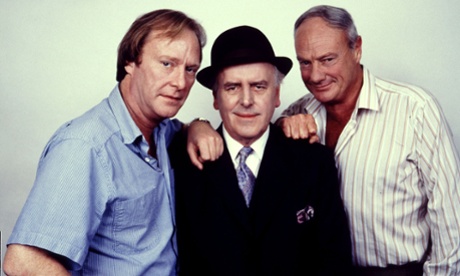
The death of the actor George Cole has rightly resulted in a rush of clips and memories of his stand-out TV role: the bumbling crook Arthur Daley in Minder. But, for me, thoughts of Cole’s frequently belittled Mr Big always blur with two other peak-time characters of the same era who also had a comically troubled relationship with the law: David Jason’s Del Boy Trotter in Only Fools and Horses and Leo McKern’s Horace Rumpole in Rumpole of the Bailey.
Apart from the fact that they competed for audiences and awards over a period of more than a decade, a Venn diagram representing these three vivid creations would have other shared areas. Arthur overlapped with Del Boy as con artists with a low success rate and with Rumpole in introducing into common golf-club parlance cringing euphemisms for wives: Hilda Rumpole was “She Who Must Be Obeyed” while the unseen Mrs Daley was “’er indoors”. It is also easy to imagine – in an episode on some fantasy TV channel – Rumpole defending Del or Arthur after Her Majesty’s Constabulary or Revenue & Customs caught up with some chaotic scam.
But the trio is also linked by the influence of two British historical figures: Charles Dickens and Margaret Thatcher.
The adjective “Dickensian” can be a reflex description for any English fictional character of vivid appearance and speech; in the case of Daley, Trotter and Rumpole, though, it is precise and fitting. We most recognise the importance of Dickens to the TV schedules in the almost rotational adaptation of his novels by the BBC and ITV, but it is equally significant that some of the most successful writers of popular drama have tended to be disciples of the novelist, learning from his use of catchphrases, mannerisms and distinctive physical silhouettes.
John Mortimer openly acknowledged the debt, and aspects of several of the many lawyers in Dickens’s cast-lists – Mortimer Lightwood, Conversation Kedge and Sydney Carlton – can be spotted in Rumpole. Leon Griffiths, creator of Minder, and John Sullivan, who wrote Only Fools and Horses, meanwhile had encountered Dickens through library books or tea-time serials and the lessons showed when they came to create their own lovable eccentric grotesques. Both Daley and Del Boy combine the profession of Fagin with the ridiculous optimism of Mr Micawber.
Further evidence that even Rumpole might struggle to dismiss as coincidence is that the actors who created the characters all had Dickensian credits as well: McKern was Mr Boffin in Our Mutual Friend, Cole’s roles included Scrooge in A Christmas Carol and, in 2001, Jason starred in ITV’s Micawber, a spin-off series written for him by Sullivan as one of their post-Trotter projects.
Apart from the Dickens connection, another cultural affinity between the characters is that Rumpole, Daley and Trotter – launching their TV series in 1978, 79 and 80 respectively – arose at the beginning of the Thatcher era. Arthur and Del Boy – who would both undoubtedly have voted for Britain’s first woman prime minister, however alarmingly she might have reminded them of She Who Must Be Obeyed and ’Er Indoors – became comically symbolic of the strain of dodgy entrepreneurism that many saw in Thatcherite economics, although the huge ratings for both shows suggest that Tory voters either enjoyed the joke or saw the wheeler-dealers as role-models. Rumpole, like his creator, was specifically anti-Thatcherite and, in the latter stages of his career, specifically opposed her administration’s erosions of civil liberties and social justice.
Reflecting the era from which they came, these titanic characters may also have been confined to it. The only recent male grotesque to match the trinity from the 70s and 80s is DCI Gene Hunt, the dodgy copper played by Philip Glenister in Life on Mars and Ashes to Ashes. Although screened from 2006 to 2008, Hunt was, because of the time-slip plot, a 70s character who might, in other circumstances, have interrogated Del Boy or Daley or been cross-examined by Rumpole.
And perhaps such television figures can only live in the past. Because Daley, Trotter and Hunt were all extreme stereotypes of the London working classes, my suspicion is that they would be hard to create in a drama set today because of the increasing obsession of drama departments – enforced by regulators and Tweeters – with avoiding pejorative representation or the giving of offence. These days, Minder or Only Fools and Horses would risk a petition from the Confederation of Small London Businesses about the misrepresentation of the self-employed in the retail sector.
The Dickens influence on TV drama, though, continues. Tony Jordan, a key writer on EastEnders, is another devotee of the author and, later this year, BBC1 will screen Jordan’s drama Dickensian, in which various characters from the novels become involved in a new storyline. From Arthur Daley to today, the author has been, for so many major TV dramatists, their mutual friend.

